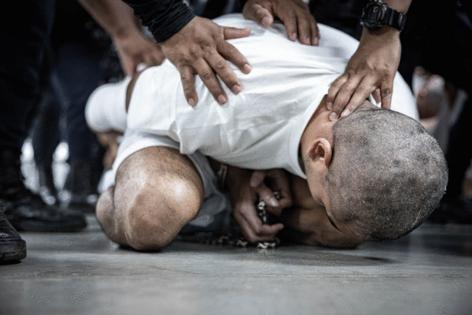ACLU asks Supreme Court to uphold judge's order halting Alien Enemies Act deportations
Published in News & Features
WASHINGTON — Lawyers for the American Civil Liberties Union argued to the U.S. Supreme Court on Tuesday that the Trump administration had not satisfied an “exceedingly high burden” required to override a judge’s temporary order to stop migrant deportations to a notorious Salvadoran mega prison.
In a 42-page filing to the justices, the lawyers said the government’s invocation of the Alien Enemies Act should not apply since there is no declared war with Venezuela and that courts must be able to review whether individuals have been mistakenly labeled as members of the feared Tren de Aragua Venezuelan gang.
On Friday, the Trump administration formally asked the high court to intervene in its multi-week battle with lower courts over the president’s right to deport alleged Venezuelan gang members using the Alien Enemies Act, a 227-year-old law that’s been invoked only three times previously. They are asking the Roberts court to vacate a temporary restraining order issued on March 15 by U.S. District Judge James E. Boasberg in Washington.
In its response, the ACLU warned that the government has already deported hundreds without any notice, and urged the nation’s highest court to reject what it called an “extraordinary request” to vacate Boasberg’s order.
And the Trump administration acknowledged in a court filing on Monday that it mistakenly deported a Maryland man to El Salvador due to an administrative error. Despite the admission, the administration asserts that it lacks the authority to facilitate his return to the U.S., raising questions about others who may have been mistakenly ensnared.
Boasberg’s temporary restraining order “does not order anyone’s release, nor does it prevent the government from carrying out removals under the Immigration and Nationality Act,” the ACLU lawyers wrote.
Without Boasberg’s order, the plaintiffs “will suffer extraordinary and irreparable harms – being sent out of the United States to a notorious Salvadoran prison where they will remain incommunicado, potentially for the rest of their lives, without having any opportunity to contest their designation as gang members,” the filing continues.
The ACLU brief notes that the government has previously conceded that individuals are entitled to contest their designation as a gang member and are resting their case on a “technical” issue about the type of legal challenge and its venue.
Last week, a three-judge appeals court panel in D.C. denied a Trump administration request to lift Boasberg’s order. Boasberg then extended his temporary restraining order until April 12.
It’s unclear when the Supreme Court will take up the arguments in the case, but given the emergency nature of the application it could make a decision without full oral arguments.
In its brief, the ACLU asserted that “many (perhaps most)” of those subjected to deportation “were not actually members of Tren de Aragua, and were instead erroneously designated as such in large part because of their tattoos, a wholly unreliable means of identifying membership in that particular gang.”
On Monday, White House Press Secretary Karoline Leavitt vigorously defended the Department of Homeland Security’s vetting process in determining the designation of gang members.
“There is a litany of criteria that they use to ensure that these individuals qualify as foreign terrorists and to ensure that they qualify for deportation,” she told reporters at the White House. “And the president made it incredibly clear to the American public that there would be a mass deportation campaign of not just foreign terrorists, but also illegal criminal aliens who have been wreaking havoc on American communities. And shame on you and shame on the mainstream media for trying to cover for these individuals.... This is a vicious gang.”
_____
©2025 Miami Herald. Visit miamiherald.com. Distributed by Tribune Content Agency, LLC.







Comments